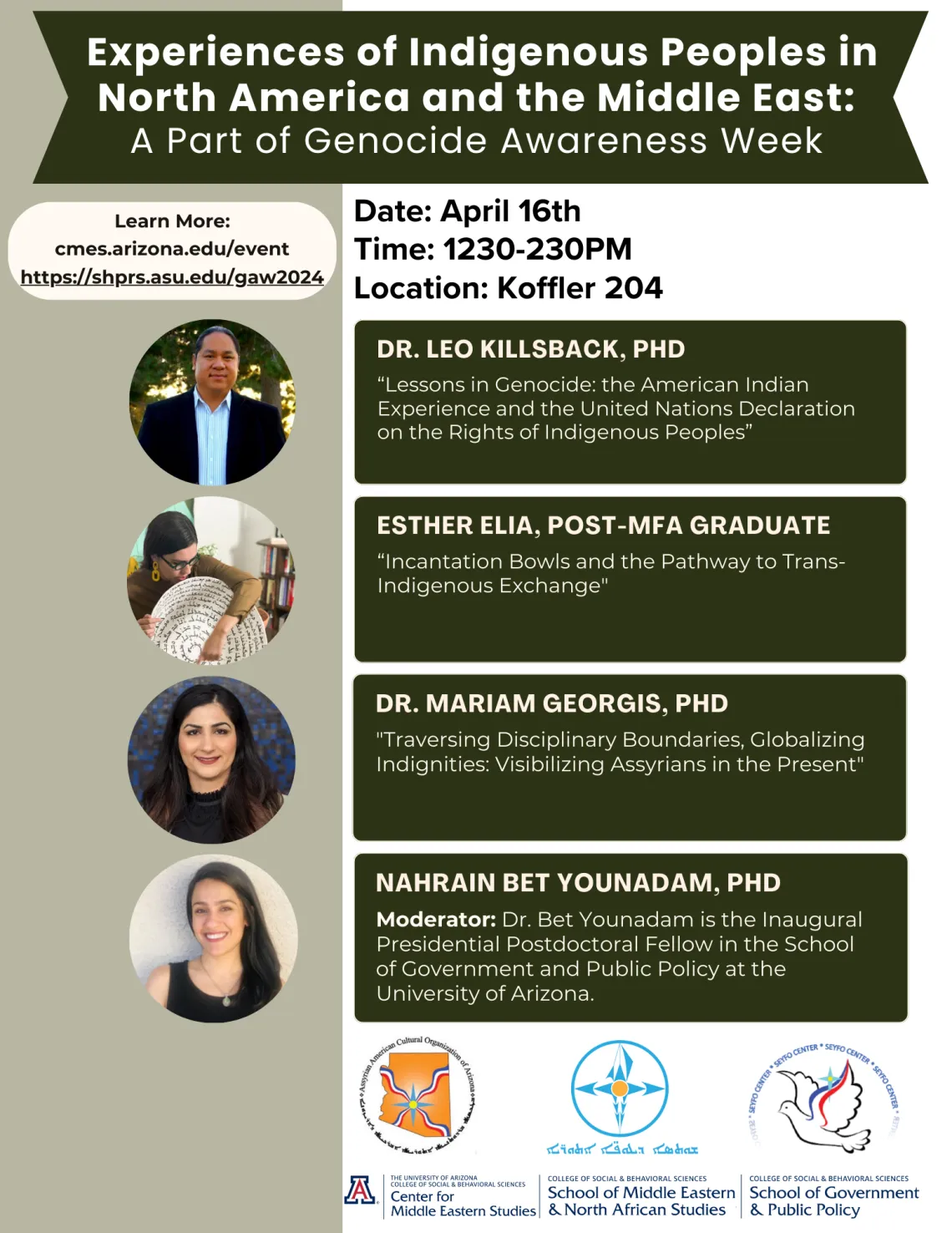Experiences of Indigenous Peoples in North America and the Middle East: A Part of Genocide Awareness Week

When
Where
Experiences of Indigenous Peoples in North America and the Middle East: A Part of Genocide Awareness Week
Dr. Leo K. Killsback, Ph.D.
J.D. Candidate, James E. Rogers College of Law
Leo K. Killsback (Northern Cheyenne) is an award-winning scholar and author of Indigenous political theory, sovereignty, history, and culture. Dr. Killsback is the recipient of the Stubbendick Distinguished Book Award and the Donald Fixico Book Award for his two books: A Sacred People: Indigenous Governance, Traditional Leadership, and the Warriors of the Cheyene Nation, and A Sovereign People: Indigenous Nationhood, Traditional Law, and the Covenants of the Cheyenne Nation. Dr. Killsback is a proud alum of the University of Arizona (2005, 2010) and former Associate Professor at Arizona State University. He is currently a Juris Doctoral Candidate at the James E. Rogers College of Law. Dr. Killsback’s current research interests include critical legal theory, human rights, international Indigenous rights, Federal Indian Law, and restorative justice.
Lessons in Genocide: the American Indian Experience and the United Nations Declaration on the Rights of Indigenous Peoples
The history of Native America is rarely told from the perspective of Indigenous peoples, and yet the commonly accepted narrative is that the colonization of Native America was simply a clash between primitive tribal aboriginals and advanced civilized nations of Europe. I intend to offer Indigenous perspectives of the colonization of Native America, relying on the development of international law, treaty rights, and human rights. The story of the colonization of Native America should not be accepted as the inevitable demise of Indigenous Nations, but should be understood as the failure of spiritual maturity and a lesson for humanity.
Esther Elia
Post-MFA Graduate
Esther Elia (she/her) is from Turlock, California. She received a BFA in Illustration from California College of the Arts, and a Masters of Fine Arts in Painting/Drawing from the University of New Mexico. Her art practice focuses on the Assyrian experience in diaspora, and uses painting and sculpture to explore themes of creating homeland and culture as a currently stateless nation. She uses storytelling as a tool for decolonization and community healing, and collects contemporary Assyrian histories as a salve to the Western institutional canon and its hyper-focus of Assyrians solely within their ancient context. Her work has been displayed in the deYoung Museum, San Francisco Arts Commission Galleries, Facebook offices, Reconstructed Mag, Guggenheim Summer College Workshop website, and the Assyrian region of Iraq (Nahla).
Incantation Bowls and the Pathway to Trans-Indigenous Exchange
The talk will outline how research into Assyrian Incantation bowls resulted in the projects "The Assyrian Prayer Bowl Archive" and "Native Soil." The latter was a community arts initiative that brought Native American potters from the Southwest to the Assyrian village of Bebedeh (Northern Iraq) to hold clay workshops in June 2023.
Dr. Mariam Georgis, Ph.D.
Assistant Professor of Global Indigeneity
Mariam Georgis is Assistant Professor of Global Indigeneity in the Department of Gender, Sexuality and Women’s Studies at Simon Fraser University. She is Assyrian, Indigenous to present-day Iraq and currently living on and sustained by the unceded traditional territories of the Coast Salish Peoples, including the Tsleil-Waututh, Kwikwetlem, Squamish, and Musqueam Nations. Grounded in embodied decolonial feminist epistemologies, her scholarship is located at the nexus of global politics, critical Indigenous studies, and Middle East studies. Her research interests include issues of global security; global colonialism(s), Indigeneities, and decolonization; and politics of southwest Asia.
Traversing Disciplinary Boundaries, Globalizing Indignities: Visibilizing Assyrians in the Present
The author’s work spans the disciplinary boundaries of political science, Middle East studies, Indigenous studies, and their subfields. Broadly situated within critical theoretical bodies of knowledge, she focuses on an Indigenous nation in what is today known as Iraq. Her work is grounded within particular and fragmented locations that blur various lines and multiple layers of coloniality. This article offers a critical reflection of the invisibility in working on Indigeneity in southwest Asia within the structural imperatives of the academy. It takes up each of these themes by examining the fields of international relations and Iraqi studies to show how the story of Assyrians is invisible or unintelligible across these fields of political science and Middle East studies. Moreover, what the Assyrian story tells us about these disciplines and the multiplicity of coloniality (Patel 2019) is also rendered invisible. Despite the absence of Assyrians from Indigenous studies, the author sees this field as a site from which to potentially globalize Indigeneities. Specifically, she uses Indigenous feminism to construct a more nuanced framework into Assyrian histories, a framework that uses the lens of colonialism, land theft, erasure, and genocide to reframe the Assyrian experience as a remnant of the colonial global order.

